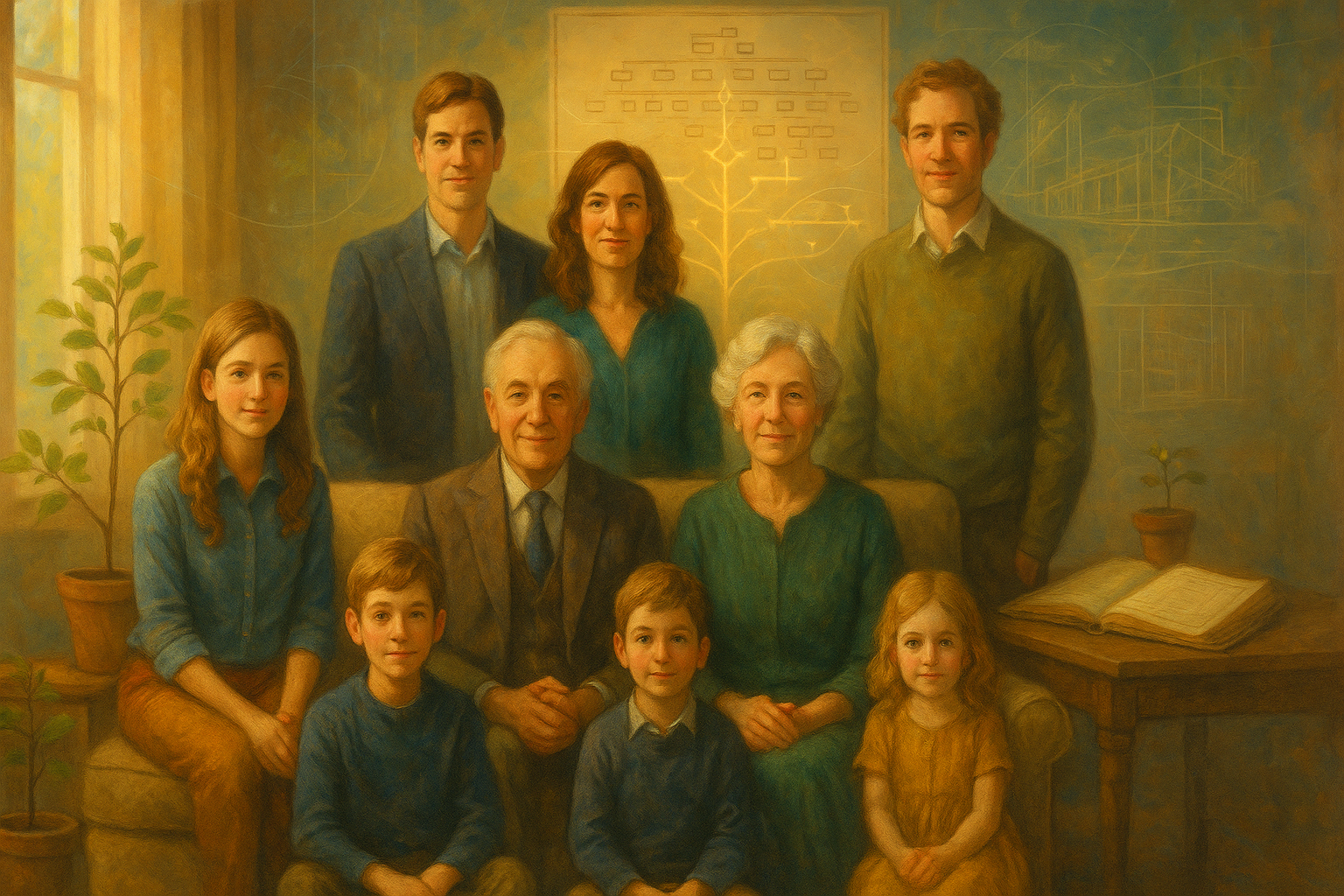How do life events shape ownership transfers?
Susan Lanz, Gary Burke, Kajsa Haag, Omid Omidvar
Audio > Play / Stop
CeFEO's Authors
CeFEO counts more than 50 scholars and 30 affiliated researchers. Several studies and reports have consistently identified CeFEO as a leading research environment worldwide in the area of ownership and family business studies.
This research project, has been co-authored by the following CeFEO Members.
Reference
Spotlight highlights research-based findings only. If you’re interested in exploring this project further or delving into the theoretical and methodological details, we encourage you to contact the authors or read the full article for a comprehensive understanding.

Lanz, S., Burke, G., Haag, K., & Omidvar, O. (2025). Family lives in motion: Toward a life course process theory of ownership transfer in business-owning families. Family Business Review, 38(3), 210–238.
https://doi.org/10.1177/08944865251361198

What is Spotlight?
Spotlight is an innovative online family business magazine designed to bridge the gap between cutting-edge research and the real-world needs of practitioners, owners, and policymakers. Drawing on the latest findings from the Centre for Family Entrepreneurship and Ownership (CeFEO) at Jönköping International Business School, Spotlight delivers insightful, accessible summaries of key research topics. Our mission is to keep the family business community informed and empowered by offering actionable insights, expert analyses, and forward-thinking strategies that enhance business leadership and ownership practices for long-term success.

This article is brought to you by the WIFU Foundation
Spotlight is generously supported by the WIFU Foundation, which promotes research, education, and dialogue in the field of family business. This partnership enables us to continue bridging academic insights and real-world practice for the advancement of responsible family entrepreneurship and ownership.
More than shares: a life course view on ownership in family business
When we think about family business succession, our minds often go to who will be the next leader. Nonetheless, this study shows that the equally important question — who owns the business and how that ownership changes over time — is more complex, emotional, and unpredictable than most models suggest.
When we think about family business succession, our minds often go to who will be the next leader. Nonetheless, this study shows that the equally important question — who owns the business and how that ownership changes over time — is more complex, emotional, and unpredictable than most models suggest.
Succession in family businesses has long been described as a linear relay race: the founder hands the baton to the next generation, who then pass it on in turn. This model — most famously described by Gersick and colleagues in their life cycle model — still dominates how many family businesses and advisors think about ownership transfer.
But in practice, things are rarely that straightforward. Marriage, divorce, illness, or sibling rivalries can upend the most carefully laid succession plans. Ownership shares may be distributed, withdrawn, or redistributed multiple times before leadership even changes.
The reality, as this study demonstrates, is that ownership transfer is a process in motion — one that unfolds across time, shaped by unpredictable life events and the unique dynamics of each family .
What We Studied
The research team undertook a narrative inquiry, interviewing 27 members across 12 UK-based family businesses. These firms ranged from small, multi-generational companies to large enterprises, spanning industries from construction to manufacturing to property.
Instead of treating ownership transfers as legal transactions, the study listened to family stories: how members described their experiences of being gifted, denied, or negotiating shares. These narratives revealed the emotional, relational, and symbolic dimensions of ownership, dimensions often ignored when ownership is seen purely in legal or financial terms.
The authors applied life course theory, a perspective from sociology and family science that studies how people’s lives unfold across time. Life course theory emphasizes that events like marriage, illness, or retirement intersect with historical context and linked family lives. In the context of family business, this means that ownership transfer cannot be separated from the evolving trajectories of family members’ lives .
Key Insights
The study identifies three distinct patterns of intrafamily ownership transfers (IOTs). Each has its own drivers, temporal logic, and implications for family business survival.
1. Symbolic Ownership Transfers: Creating Bonds Through Inclusion
Symbolic transfers are small gestures that bring younger family members “into the fold.” Parents may gift a minority stake to children while still retaining control. These shares often carry little financial power, but they serve as a signal of belonging and a way of cultivating future commitment.
- Case in point – Saturn family: All three children received a 10% share in childhood, held in trust until they turned 25. The shares carried no decision-making rights, but they fostered emotional ties to the business. Years later, two of the siblings became senior managers and are now preparing for full succession .
- Case in point – Mars family: For generations, women were excluded from ownership. A later-generation leader overturned this by gifting symbolic shares to his sisters, recognizing their rightful place in the family firm.
Symbolic transfers matter because they create psychological ownership — a sense of identity and connection to the family business. They may look tokenistic at first, but they often plant seeds that grow into long-term engagement.
2. Protectionist Ownership Transfers: Safeguarding the Legacy
Protectionist transfers arise when families perceive risks to ownership continuity — such as the possibility of divorce, opportunistic in-laws, or disputes among siblings. These transfers often involve complex legal mechanisms like trusts, ring-fencing, or the creation of separate holding structures.
- Case in point – Sun family: A founder gifted shares to her daughter via a trust, deliberately excluding her son-in-law. While intended as protection, the move created deep tension and mistrust across generations.
- Case in point – Pluto family: Anticipating the risk of divorce among his children, the founder split the business into two ownership structures. Each child received a share of one business, but not both — limiting potential exposure.
- Case in point – Neptune family: To prevent disputes after his death, Anthony, the founder, placed intellectual property into a subsidiary, to be managed by his daughter with oversight from a board. Access to benefits for other family members would only be triggered by major life events such as marriage, education, or buying a house.
Protectionist transfers highlight the tension between control and trust. While they protect the business, they can also signal exclusion, leaving some family members feeling marginalized.
3. Rebalancing Ownership Transfers: Correcting Past (In)Justice
Unlike symbolic and protectionist transfers, which look to the future, rebalancing transfers are rooted in the past. They occur when families attempt to correct perceived unfairness in how ownership or dividends were previously distributed.
- Case in point – Earth family: A father blocked his children from buying out relatives, arguing that past generations had already enjoyed financial benefits during “good times.” He insisted that fairness required sharing risks, not just rewards.
- Case in point – Mercury family: After years of carrying the financial burden of his parents and siblings, Walter demanded a larger shareholding to support his own children’s education. His request was granted but strained relations with his mother.
- Case in point – Europa family: Dariya, who co-founded a business with her father, resisted his plan to redistribute shares equally among all siblings — most of whom were uninvolved. With support from her siblings, she eventually secured majority ownership.
Rebalancing transfers are emotionally charged, often tied to long memories of sacrifice or betrayal. If handled poorly, they can deepen divisions. But when managed transparently, they can restore a sense of fairness and legitimacy in family ownership.
Takeaways
1. Start Early with Symbolic Transfers
Don’t underestimate the power of small gestures. Gifting symbolic shares can build emotional ties and encourage the next generation to see themselves as future stewards.
2. Balance Protection with Trust
Protectionist measures like trusts and shareholder agreements are vital, but secrecy or exclusion can breed resentment. Clear communication is essential to avoid undermining family unity.
3. Address Fairness Openly
Ownership often carries symbolic meaning beyond financial value. Families should create safe spaces — councils, boards, or facilitated conversations — to discuss fairness before grievances harden.
4. Separate Ownership from Leadership
Ownership transfers and succession are related, but not identical. Treating them as separate processes allows families to design ownership structures that support, rather than complicate, leadership transitions.
Impact
The study advances a crucial idea: ownership transfer is not just about business continuity — it is about family life.
By showing that IOTs often unfold independently of leadership succession, the research helps family firms see ownership as a dynamic process embedded in family histories, events, and relationships. This perspective can help business families plan more flexibly, anticipating that ownership will likely shift multiple times before and after formal succession.
For policymakers and advisors, the findings underscore the importance of offering guidance not just on tax efficiency or governance structures but also on family dynamics, fairness perceptions, and intergenerational dialogue.
Recommendations for Practice
- Introduce ownership gradually through symbolic shares, cultivating attachment without overwhelming the next generation.
- Use legal tools wisely but pair them with open conversations to prevent distrust.
- Acknowledge history when redistributing shares — family memories and past contributions matter as much as present-day needs.
- Invest in governance structures like family councils or advisory boards to mediate conflicts around ownership fairness.
- Recognize diversity in family forms — blended families, in-laws, and gender norms shape ownership decisions in increasingly complex ways.

CeFEO's Authors
CeFEO counts more than 50 scholars and 30 affiliated researchers. Several studies and reports have consistently identified CeFEO as a leading research environment worldwide in the area of ownership and family business studies. This research project, has been co-authored by the following CeFEO Members.
Reference
Spotlight highlights research-based findings only. If you’re interested in exploring this project further or delving into the theoretical and methodological details, we encourage you to contact the authors or read the full article for a comprehensive understanding.

Lanz, S., Burke, G., Haag, K., & Omidvar, O. (2025). Family lives in motion: Toward a life course process theory of ownership transfer in business-owning families. Family Business Review, 38(3), 210–238.
https://doi.org/10.1177/08944865251361198

What is Spotlight?
Spotlight is an innovative, AI-powered, online family business magazine designed to bridge the gap between cutting-edge research and the real-world needs of practitioners, owners, and policymakers. Drawing on the latest findings from the Centre for Family Entrepreneurship and Ownership (CeFEO) at Jönköping International Business School, Spotlight delivers insightful, accessible summaries of key research topics. Our mission is to keep the family business community informed and empowered by offering actionable insights, expert analyses, and forward-thinking strategies that enhance business leadership and ownership practices for long-term success.

This article is brought to you by the WIFU Foundation
Spotlight is generously supported by the WIFU Foundation, which promotes research, education, and dialogue in the field of family business. This partnership enables us to continue bridging academic insights and real-world practice for the advancement of responsible family entrepreneurship and ownership.










